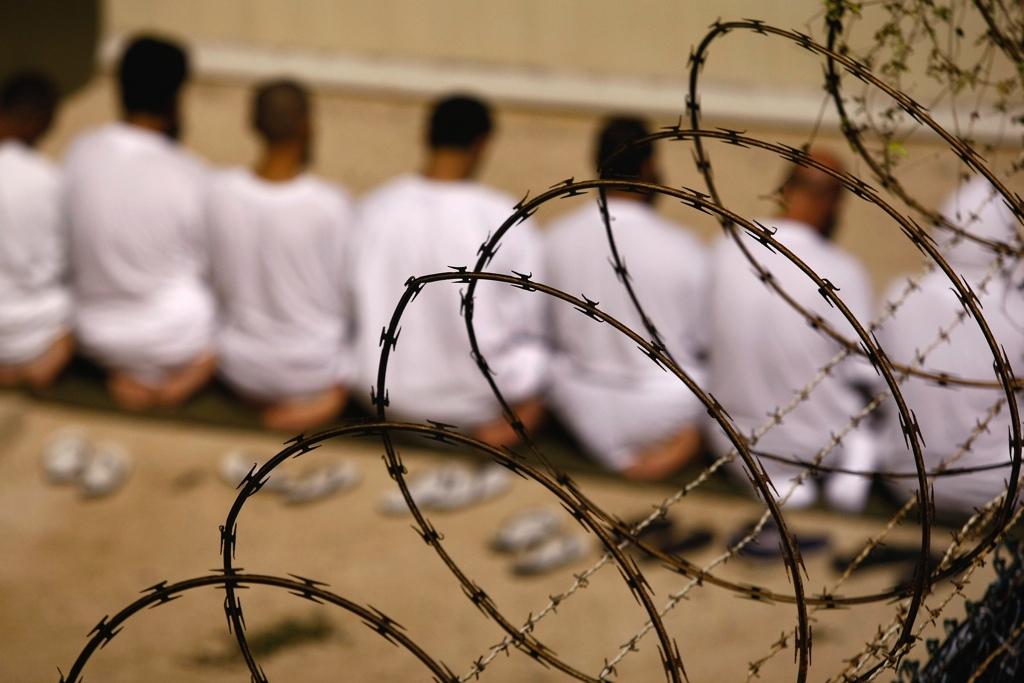These are the 5 Guantanamo detainees who might be moving to Uruguay
A group of detainees kneels during an early morning Islamic prayer in the US military prison at Guantanamo Bay.
MONTEVIDEO, Uruguay — President Jose Mujica has stunned residents here by accepting a deal proposed by the United States to give refuge to five prisoners from the Guantanamo Bay detention center in Cuba.
Since Mujica’s sudden announcement last week, there’s been some confusion about what’s happening with the prisoners.
Mujica told local reporters March 21 he would ask the US government to free Cuban political prisoners in exchange for Uruguay accepting the Guantanamo detainees.
But the US ambassador to Montevideo said the two governments have yet to reach an agreement — and she dismissed the idea of an exchange outright.
“There is no exchange arrangement of any kind,” Ambassador Julissa Reynoso told local media. “The proposal is a humanitarian act to be able to manage the transfer of these individuals to different parts of the world, without conditions.”
Mujica has also since said the released prisoners would be free to travel onward from Uruguay, raising further questions about how such a deal will be crafted.
The president is a former political prisoner himself, having survived 14 years in prison stemming from his activities as a revolutionary in the 1960s and 1970s. He and other leaders in Latin America and the world over have consistently pressed Washington to close Guantanamo.
More from GlobalPost: Uruguay may import marijuana from Canada
What we do know with some degree of certainty is the identity of the Guantanamo detainees who would move to Uruguay.
On Monday, Mujica told Montevideo’s El Espectador Radio that the prisoners who could be relocated here are four Syrians and one Palestinian. There are only four Syrians and one Palestinian currently eligible for release from Guantanamo, according to watchdog group Human Rights First.
A senior US government official told GlobalPost he couldn’t confirm or deny that these five men are the prisoners who would be released.
The plan in the works is part of President Barack Obama’s pledge to close Guantanamo Bay in 2014.
According to the website Closeguantanamo.org, which tracks the facility's prisoner population, 615 of the total 779 detainees have been released or transferred, 83 of them since Obama took office. An additional 154 prisoners remain incarcerated, according to the website. (Nine others have died, while one detainee was moved to the US for trial.)
Secret US government documents made public by WikiLeaks provide ample information about their identities. GlobalPost put together this guide to who the detainees are and how they ended up at Guantanamo, along with links to a bit of extra reading and the WikiLeaks files on each detainee.
Mohammed Abdullah Taha Mattan
![]()
Internment Serial Number (used by the Pentagon to identify prisoners): 684
Nationality: Palestinian Territories
Time incarcerated: 11 years
Captured: March 28, 2002, Faisalabad, Pakistan
Read WikiLeaks documents about him here.
Read more: Check out this profile written by one of Taha Mattan’s attorneys for Al Jazeera.
Ali Al Shaaban
![]()
Internment Serial Number: 327
Nationality: Syrian
Time incarcerated: 11 years
Captured: December 2001, Tora Bora, Afghanistan
Read WikiLeaks documents about him here.
Read more: Here’s a profile in The Boston Globe written by one of Al Shabaan’s lawyers.
Abdul Hadi Omar Mahmoud Faraj
![]()
Internment Serial Number: 329
Nationality: Syrian
Time incarcerated: 11 years
Captured: December 2001, Tora Bora, Afghanistan
Read WikiLeaks documents about him here.
Ahmed Adnan Ahjam
![]()
Internment Serial Number: 326
Nationality: Syrian
Time incarcerated: 11 years
Captured: December 2001, Tora Bora, Afghanistan
Read WikiLeaks documents about him here.
Read more: Read an interview with one of Ahjam’s attorneys here.
Jihad Dhiab
![]()
Internment Serial Number: 722
Nationality: Syrian (Born in Lebanon)
Time incarcerated: 11 years
Captured: April 2002, Lahore, Pakistan
Read WikiLeaks documents about him here.
Read more: Check out this blog post by a US District Court Judge on Dhiab’s 11 years in captivity.
The story you just read is accessible and free to all because thousands of listeners and readers contribute to our nonprofit newsroom. We go deep to bring you the human-centered international reporting that you know you can trust. To do this work and to do it well, we rely on the support of our listeners. If you appreciated our coverage this year, if there was a story that made you pause or a song that moved you, would you consider making a gift to sustain our work through 2024 and beyond?
